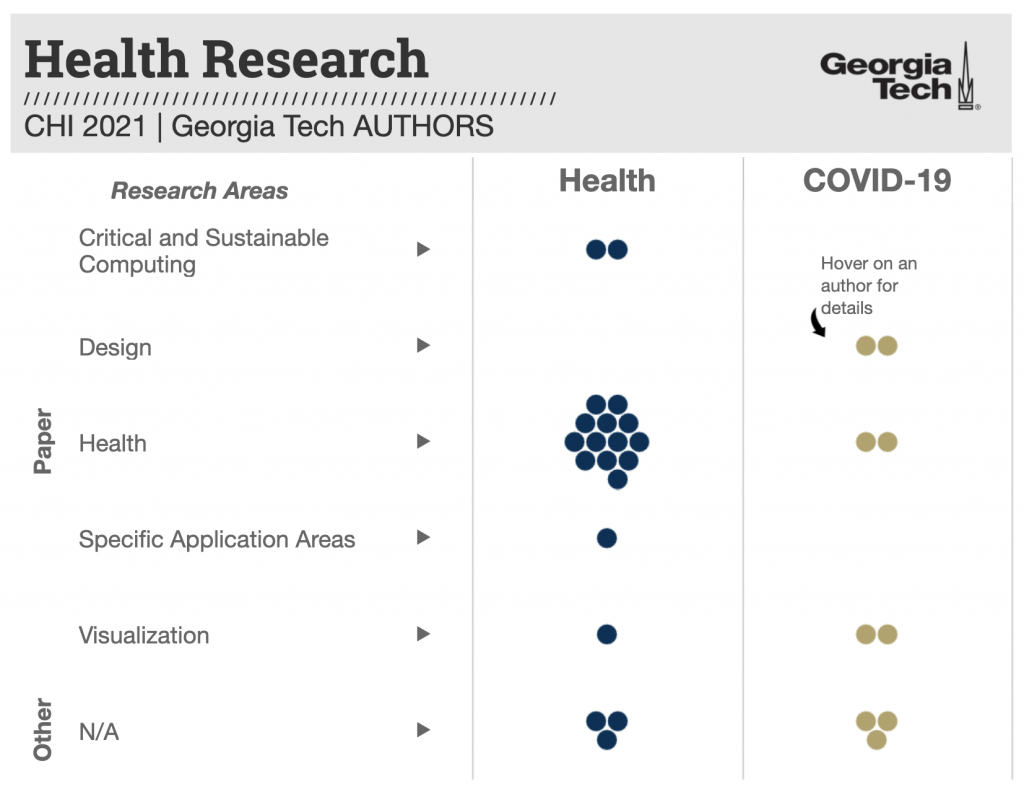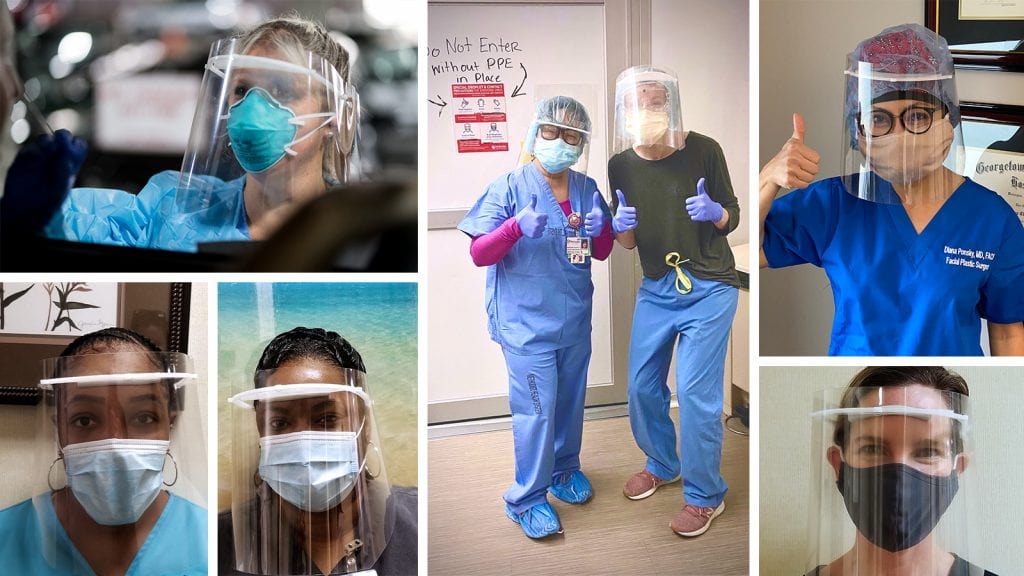Impacting Health Care through Technology
There has long been a growing body of research in human-computer interaction with impact in health care, mental health care, equity in health, and more. Georgia Tech researchers have been leaders in the space on a number of fronts.
This year, in response to the Covid-19 pandemic, the HCI community has responded, as well. From examining the impact of makers on distribution of personal protective equipment to mapping crisis through data visualization to measuring equitable health care response and much more, Georgia Tech researchers have contributed in varying impactful ways.
Explore pandemic response as well as the larger corpus of health care research from Georgia Tech authors at this year’s CHI conference in the visualization and research highlights below.
Click the image below to navigate to an interactive visualization on Georgia Tech’s research.

AI in Global Health: The View from the Front Lines
(Azra Ismail, Neha Kumar)
Background: There has been a growing enthusiasm about the potential for artificial intelligence in frontline health. The trend has become more popular in the wake of the Covid-19 pandemic, offering promises like diagnostic tools or disease forecasting, among much more.
Challenge: The promise of AI solutions is matched by the concerns over whether the big data models accurately reflect the realities on the ground.
Results: An extensive review of literature proposing applications, predominantly in the Global South, showed that their development was rarely done in concert with non-tech stakeholders. This led to societal gaps like complementary and alternative medicine, religious practices, patient choice, and more.
Impact: The paper provides an outline for improving on-the-ground agency for communities with respect to AI solutions, encouraging a focus on hyperlocal deployments, supporting self-determination of communities, engaging with diverse disciplines, and more.
Using Conversational Agents to Empower Older Adults Suffering From Mild Cognitive Impairment and Care Partners
(Tamara Zubatiy, Kayci L. Vickers, Niharika Mathur, Elizabeth D. Mynatt)
Background: About 20 percent of adults over 65 will get mild cognitive impairment (MCI) and, of those, 80 percent will progress to Alzheimer’s disease or dementia. People with MCI experience more difficulties with memory and decision making compared to others their age.
Challenge: Many with MCI rely on spouses or adult children to act as care partners for them.
Results: Researchers deployed Google Home Hubs with dyads of older adults with MCI and their care partners. Care partners logged roughly double the number of interactions as those with MCI, but the latter also used the conversational agent fairly regularly. The work shows that the agent could provide comfort, entertainment, social presence, and

information to those with MCI. For care partners, they were empowered by the agents because of the ability to scaffold interaction in advance to allow for more independence for their partner.
Impact: Despite remaining challenges, like remembering the agent was there or finding words to initiate conversations, there is potential to empower individuals going through MCI, along with their families.
Outcomes of Making PPE During a Health Care Crisis
(Kelly Mack, Megan Hofmann, Udaya Lakshmi, Jerry Cao, Nayha Auradkar, Rosa Arriaga, Scott E. Hudson, Jennifer Mankoff)
Background: In response to the Covid-19 pandemic, a collection was formed for submissions of low-cost personal protective equipment (PPE) through the NIH 3D Print Exchange.
Challenge: What did makers contribute and what informed their designs? How were they made, by whom, and what are the key characteristics of each?
Results: This study evaluated 623 submissions in the collection to gain a better understanding of each question. The analysis revealed an immediate design convergence to derivatives of a few initial designs. While the NIH initially reviewed these safe and effective designs, they were overloaded with these derivative works. As a result, most submissions were never reviewed.
Impact: The work contributes insights into outcomes of community-based medical making, features that the community accepted as “safe” making, and how platforms can support regulated maker activities in high-risk domains.
How Social and Self Modeling Can Support Physical Activity Among Families of Low Socioeconomic Background
(Herman Saksono, Carmen Castaneda-Sceppa, Jessica Hoffman, Magy Seif El-Nasr, Andrea Parker)
Background: Physical activity is crucial for reducing the risk of obesity, which disproportionately burdens families of low socioeconomic status.
Challenge: Fitness tracking tools increase awareness of physical activity, but not much is known about how these tools help people benefit from their social environments and how reflections can enhance physical activity attitudes.
Results: Researchers investigated how fitness tracking tools for families can support social modeling and self-modeling through reflection. They developed StoryMap, a novel application for families aimed at supporting both, and conducted a five-week qualitative study to evaluate. Findings led to a few design recommendations, such as inviting reflections on success stories, supporting story exchange, inviting reflections that lead to action, and amplifying community, among others.
Impact: The findings contribute to a better understanding of how social and self-modeling can be implemented in fitness tracking tools to enhance key physical activity attitudes.
Charting the Unknown: Technology Use and Eating Disorders
(Jessica Pater, Fayika Farhat Nova, Amanda Coupe, Lauren E. Reining, Connie Kerrigan, Tammy Toscos, Elizabeth D. Mynatt)
Background: Questions surrounding the impact of social technologies on mental health, including eating disorders, have become a common thread within the field of human-computer interaction.
Challenge: This paper reviews results of an interview study of 10 clinicians of varying specialties who treat individuals with eating disorders to help understand the clinical contexts of eating disorders and social media use.
Results: There are tensions between clinician comfort and education into the use — or misuse — of technologies and balancing differing aspects of social media use throughout disease states.
Impact: It’s important to understand these tensions as well as variation in processes of diagnosing patients. Connecting HCI research focused on eating disorders to clinical practice is a vital component to ultimately assessing how digital self harm could be addressed in the future.
Reviewing Strategies of Data Collection and Communication in Eating Disorder Apps
(Anjali Devakumar, Jay Modh, Bahador Saket, Eric P.S. Baumer, Munmun De Choudhury)
Background: Among mental illness, eating disorders have the highest mortality. Mental health apps provide promising means for condition management by monitoring eating habits, thoughts, feelings, and offering analytic insights for behavioral change.
Challenge: Scholars have critiqued the clinical validity of these apps, and the underlying design principles are not yet well understood.
Results: Researchers reviewed 34 apps to uncover 11 different data types that eating disorder apps collect along

with nine strategies they employ to support collection and reflection. They found that most apps do not adhere to best practices on what and how data should be collected or insights communicated.
Impact: The research provides insight into how to improve design of eating disorder apps to lead to more useful and meaningful recovery.
How Does Community Knowledge Impact Support-Seekers’ Satisfaction with Received Comments in Mental Health Communities?
(Zhenhui Peng, Xiaojuan Ma, Diyi Yang, Ka Wing Tsang, Qingyu Guo)
Background: Online mental health communities can be resources for improving wellbeing. An immediate cue of improvement is the expressed satisfaction by support-seekers’ in replies to received comments.
Challenge: The comments that satisfy support-seekers may change depending on their community knowledge. In other words, how long they have been involved and their experience posting in that community may impact their satisfaction.
Results: Here, researchers modeled conveyed satisfaction in support-seekers’ replies then quantitatively examined how seekers’ expressed satisfaction is affected by community knowledge. Results showed that seekers with more posting experience generally displayed less contentment to comments. In comparison to newcomers, those who had been around for awhile expressed less satisfaction when receiving informational support.
Impact: This research could help online mental health communities better satisfy support-seekers through their community knowledge.
Fostering and Regulating Collective Action in Maker Response to Covid-19
(Megan Hofmann, Udaya Lakshmi, Kelly Mack, Scott E. Hudson, Rosa Arriaga, Jennifer Mankoff)
Background: In response to Covid-19, there was a surge in medical making — using tools like 3D printers to design and distribute medical devices like face shields outside of the typical manufacturing structure. The scale changed from thousands of makers to hundreds of thousands of makers.
Challenge: There are opposing value systems in such medical making. On one hand, the medical community seeks a “do no harm” mentality, while makers are often driven by the desire to innovate.
Results: In this paper, researchers present a participant observation study of 14 maker communities that have developed differing driving principles. Over time, these communities unintentionally align towards action-oriented or regulated practices because they often lack higher level insight and agency in choosing communication platforms.
How Can We Build Technologies That Support Social Justice and Health Promotion at the Intersection of Race and Religion?
(Teresa K. O’Leary, Elizabeth Stowell, Jessica Hoffman, Michael Paasche-Orlow, Timothy Bickmore, Andrea G. Parker)
Background: Churches have historically played an important role in Black American communities and been a foundation for the pursuit of social justice, community organization, and health promotion.
Challenge: It has rarely been examined how technology can support these efforts, nor have the implications of race, traditions, and history when creating such systems.
Results: Researchers conducted a study with two predominantly Black churches to explore health promotion design opportunities. Using photovoice, a research method where participants led their own data collection and analysis, participants provided descriptions of the racial and ethnic identities of their communities and how church history and future aspirations impacted identities.
Impact: Research findings characterize tensions between tradition and “modernization,” implications for technology design and the need for a temporal approach to understanding communities.
Check back during the conference as more highlights on Georgia Tech’s research are added!








